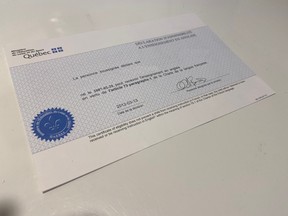An open letter from the Quebec government claims that absolutely no linguistic conditions in health care are imposed before providing service in English to anyone who requests it. We examined the claims.

Article content
Three Quebec ministers signed an open letter in The Gazette on Friday seeking to clarify a new and hotly-contested government directive regulating the use of languages other than French in health care. The following fact-checks that letter by Jean-François Roberge, responsible for the French language; Eric Girard, in charge of relations with English-speaking Quebecers; and Christian Dubé of health and social services.
Advertisement 2
Story continues below
Article content
“The government of Quebec imposes absolutely no linguistic conditions in health-care settings before providing health care in English to anyone who requests it,” the letter states.
That claim is misleading. The 31-page directive requires that “all oral and written communication must be in French.” It then specifies that other languages “can be used” in exceptional situations like emergencies that are outlined in excruciating detail.
For those seeking health care in English only, the directive imposes for the first time in Quebec history the requirement that historic anglophones must have been “issued” an English eligibility certificate from the Education Ministry, and they must expressly request health services in English. And even were a patient to produce such an eligibility certificate, the directive stipulates that a health-care institution can – not must – provide medical services in English only. Such certificates have proved difficult to obtain for anglophone students and are generally not available to adults.
Nowhere in the letter do the three ministers address the requirement of the eligibility certificate in what effectively amounts to an error of omission.
Article content
Advertisement 3
Story continues below
Article content

“Every English-speaking individual in Quebec has the right to receive health and social services in English, as per section 15 of the Act Respecting Health Services and Social Services. This right is clear and in no way is being called into question.”
This claim is misleading. Although it is true that section 15 of the Health and Social Services Act states that “English-speaking persons are entitled to receive health services and social services in the English language,” the linguistic provisions of this legislation are now subservient to the Charter of the French Language, as the Coalition Avenir Québec government amended it under Bill 96 two years ago.
The Charter of the French Language also now takes precedence over Quebec’s own Charter of Rights and Freedoms on linguistic matters. And the language charter contains several articles that are at odds with section 15 of the Health and Social Services Act, say experts like Montreal lawyer Eric Maldoff.
For example, article 46 of the language charter prohibits government employers (including in health and social services) from hiring a worker who has knowledge of a language other than French “unless the nature of the duties requires such knowledge; even in the latter case, the employer shall first take all reasonable means to avoid imposing such a requirement.” Furthermore, article 46.1 stipulates that the employer must have “restricted as much as possible the number of positions involving duties whose performance requires knowledge of a language other than” French.
Advertisement 4
Story continues below
Article content
Experts warn these provisions will immediately hamstring francophone health institutions from providing services in English and other mother tongues like Italian, while over the long term eroding the capacity of designated bilingual institutions to do the same.
“The Charter of the French Language confirms and upholds the right to health and social services in English. The adoption of the ‘Act respecting French, the Official and Common Language of Quebec’ (formerly known as Bill 96), which amended the Charter, does not change the availability of health and social services in English.”
This claim is misleading, for the same reasons mentioned above.
“Moreover, the Regional Access Plans requested by the English community have been approved by the government.”
This claim is true, although the CAQ government approved the English access plans only after an arduous years-long campaign by the anglophone community.
“The recent directive published by the ministry of health and social services does not limit the circumstances under which users have the right to receive health and social services in English. Any suggestion to the contrary is false.”
Advertisement 5
Story continues below
Article content
This claim is false. The directive is densely worded and convoluted, requiring the reader to jump back and forth between its many pages, in addition to having to read sections of both the Charter of the French Language and the Health and Social Services Act to gain a full understanding – something that doctors and nurses are unlikely to do before communicating with a patient.
The litany of emergencies outlined in the directive – including the imaginary scenario of a 14-year-old girl who has just had an abortion in which the use of a language other than French can be “permitted” – convey overwhelmingly the exceptional nature of speaking in English. In any case, the requirement of an eligibility certificate for historic anglophones – and not for anglophones who have moved to Quebec from elsewhere – does in fact limit the circumstances under which users in the latter group have the right to receive health and social services in English exclusively.
“Organizations in the health and social services network do not request documentation or proof from users for the provision of care in a particular language.”
Advertisement 6
Story continues below
Article content
This claim is unverifiable, as the directive was released only on July 18, and no one knows how the requirement for the English eligibility certificate will unfold in the health sector.
“The directive also recognizes the special status of health and social service establishments, such as the Jewish General and Santa Cabrini hospitals, which were also recognized by the Office québécois de la langue française.”
This claim is misleading. The directive alludes to article 29.1 of the Charter of the French Language, which grants bilingual status to certain municipalities, school boards and hospitals. But the directive does not mention either the Jewish General or Santa Cabrini specifically.
What’s more, the Office québécois de la langue française no longer lists Santa Cabrini as protected under article 29.1 for reasons that have never been explained. Santa Cabrini is now listed on the website of the Health Ministry as an “ethnocultural institution” where interpretation and translation services are allowed.
“The government of Quebec’s intention has never been to restrict access to health care for English speakers in Quebec. We understand that many people are concerned about the directive. We will be meeting with representatives of the English-speaking community to hear their concerns and reassure them of our desire to provide health care to Quebecers without linguistic requirements. We are open to clarifying the directive to make it clear that there will never be language requirements in Quebec to treat a patient.”
These claims are unverifiable, as the government has yet to meet with leaders of the anglophone community and has not set a date.
Article content
Comments